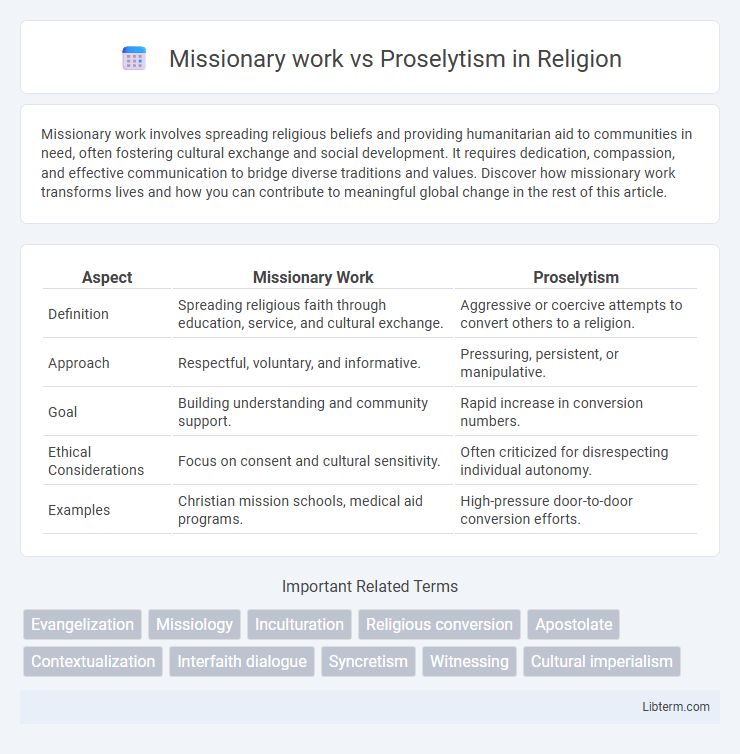Missionary work involves spreading religious beliefs and providing humanitarian aid to communities in need, often fostering cultural exchange and social development. It requires dedication, compassion, and effective communication to bridge diverse traditions and values. Discover how missionary work transforms lives and how you can contribute to meaningful global change in the rest of this article.
Table of Comparison
| Aspect | Missionary Work | Proselytism |
|---|---|---|
| Definition | Spreading religious faith through education, service, and cultural exchange. | Aggressive or coercive attempts to convert others to a religion. |
| Approach | Respectful, voluntary, and informative. | Pressuring, persistent, or manipulative. |
| Goal | Building understanding and community support. | Rapid increase in conversion numbers. |
| Ethical Considerations | Focus on consent and cultural sensitivity. | Often criticized for disrespecting individual autonomy. |
| Examples | Christian mission schools, medical aid programs. | High-pressure door-to-door conversion efforts. |
Understanding Missionary Work: Definition and Purpose
Missionary work involves spreading religious beliefs through respectful dialogue and service, aiming to share faith while honoring cultural diversity and individual autonomy. Its purpose centers on fostering genuine relationships and supporting communities without coercion or manipulation. Unlike proselytism, which often implies aggressive conversion tactics, missionary work prioritizes ethical engagement and mutual understanding.
What is Proselytism? Key Concepts Explained
Proselytism refers to the active attempt to convert individuals from one religion, belief, or opinion to another, often through persuasive or coercive methods. It involves direct efforts to change someone's faith or ideology, distinguishing it from passive religious expression or education. Key concepts include voluntariness, respect for individual autonomy, and the ethical boundaries between informed choice and manipulation in religious outreach.
Historical Perspectives: Missionary Work and Proselytism
Historical perspectives on missionary work and proselytism reveal distinct motivations and methods; missionary work often aimed at cultural exchange and social development, while proselytism focused primarily on religious conversion. Throughout history, Christian missionary efforts during the colonial era combined education, healthcare, and evangelism, influencing indigenous societies' social structures. In contrast, proselytism sometimes faced criticism for aggressive conversion tactics that disrupted existing cultural and religious identities.
Motivations Behind Missionary Efforts
Missionary work is primarily motivated by a desire to spread religious teachings, promote humanitarian aid, and foster community development within diverse cultures. Proselytism centers on actively converting individuals to a specific faith, often prioritizing numerical growth of adherents over cultural sensitivity. Understanding these motivations reveals the ethical and practical distinctions in how religious outreach is conducted globally.
Methods of Missionary Work vs. Approaches in Proselytism
Missionary work employs methods centered on cultural exchange, service, and education to build long-term relationships and foster understanding within communities. Approaches in proselytism often involve direct persuasion and active attempts to convert individuals, emphasizing immediate religious adherence. Missionary methods prioritize empathy and social support, while proselytism focuses on doctrinal transmission and influence.
Ethical Considerations in Spreading Faith
Ethical considerations in spreading faith emphasize respecting individual autonomy and avoiding coercion in both missionary work and proselytism. Missionary work often prioritizes service and voluntary engagement, fostering cultural sensitivity and mutual respect in diverse communities. Proselytism raises concerns when aggressive or manipulative tactics undermine free will, challenging the balance between religious conviction and ethical outreach.
Impact on Local Communities: Contrasts and Comparisons
Missionary work often emphasizes long-term community development and cultural exchange, fostering education, healthcare, and social support systems that benefit local populations. In contrast, proselytism centers primarily on conversion efforts, which can sometimes lead to social tensions or resistance within communities due to perceived cultural imposition. Both approaches impact local communities differently, with missionary work promoting sustained engagement and proselytism driving immediate religious adherence shifts.
Cultural Sensitivity: Respect vs. Coercion
Missionary work emphasizes cultural sensitivity by respecting local traditions, languages, and beliefs while sharing religious messages, fostering mutual understanding and trust. In contrast, proselytism often involves coercion or pressure tactics that undermine cultural autonomy and can lead to social fragmentation. Prioritizing respectful dialogue over aggressive conversion efforts ensures ethical engagement and promotes intercultural harmony.
Religious Freedom and Human Rights Issues
Missionary work, emphasizing voluntary religious education and community support, respects religious freedom and aligns with international human rights standards by promoting informed spiritual choice. Proselytism often involves coercive or manipulative tactics that can infringe on individuals' rights to freedom of conscience and belief as protected by the Universal Declaration of Human Rights. Distinguishing between respectful missionary activities and aggressive proselytism is crucial to safeguarding religious liberty and preventing violations of human dignity.
Balancing Compassion and Conviction in Faith Outreach
Missionary work emphasizes compassionate service and respectful dialogue to share faith, fostering genuine relationships without coercion. Proselytism often involves aggressive attempts to convert others, which can undermine trust and infringe on personal beliefs. Balancing compassion and conviction requires prioritizing empathy and voluntary engagement in faith outreach to promote understanding and mutual respect.
Missionary work Infographic

 libterm.com
libterm.com